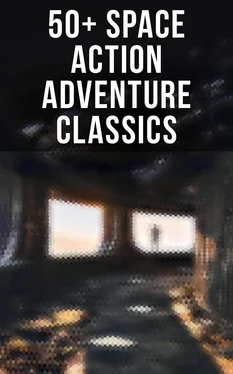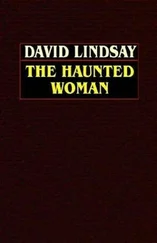I was still meditating a tremendous retort, an indictment of all Lord Redcar’s class, their manners, morals, economic and political crimes, when my trouble with Nettie arose to swamp all minor troubles. Yet, not so completely but that I snarled aloud when his lordship’s motorcar whizzed by me, as I went about upon my long meandering quest for a weapon. And I discovered after a time that my mother had bruised her knee and was lame. Fearing to irritate me by bringing the thing before me again, she had set herself to move her bed out of the way of the drip without my help, and she had knocked her knee. All her poor furnishings, I discovered, were cowering now close to the peeling bedroom walls; there had come a vast discoloration of the ceiling, and a washing-tub was in occupation of the middle of her chamber… .
It is necessary that I should set these things before you, should give the key of inconvenience and uneasiness in which all things were arranged, should suggest the breath of trouble that stirred along the hot summer streets, the anxiety about the strike, the rumors and indignations, the gatherings and meetings, the increasing gravity of the policemen’s faces, the combative headlines of the local papers, the knots of picketers who scrutinized any one who passed near the silent, smokeless forges, but in my mind, you must understand, such impressions came and went irregularly; they made a moving background, changing undertones, to my preoccupation by that darkly shaping purpose to which a revolver was so imperative an essential.
Along the darkling streets, amidst the sullen crowds, the thought of Nettie, my Nettie, and her gentleman lover made ever a vivid inflammatory spot of purpose in my brain.
It was three days after this — on Wednesday, that is to say — that the first of those sinister outbreaks occurred that ended in the bloody affair of Peacock Grove and the flooding out of the entire line of the Swathinglea collieries. It was the only one of these disturbances I was destined to see, and at most a mere trivial preliminary of that struggle.
The accounts that have been written of this affair vary very widely. To read them is to realize the extraordinary carelessness of truth that dishonored the press of those latter days. In my bureau I have several files of the daily papers of the old time — I collected them, as a matter of fact — and three or four of about that date I have just this moment taken out and looked through to refresh my impression of what I saw. They lie before me — queer, shriveled, incredible things; the cheap paper has already become brittle and brown and split along the creases, the ink faded or smeared, and I have to handle them with the utmost care when I glance among their raging headlines. As I sit here in this serene place, their quality throughout, their arrangement, their tone, their arguments and exhortations, read as though they came from drugged and drunken men. They give one the effect of faded bawling, of screams and shouts heard faintly in a little gramophone… . It is only on Monday I find, and buried deep below the war news, that these publications contain any intimation that unusual happenings were forward in Clayton and Swathinglea.
What I saw was towards evening. I had been learning to shoot with my new possession. I had walked out with it four or five miles across a patch of moorland and down to a secluded little coppice full of bluebells, halfway along the highroad between Leet and Stafford. Here I had spent the afternoon, experimenting and practising with careful deliberation and grim persistence. I had brought an old kite-frame of cane with me, that folded and unfolded, and each shot-hole I made I marked and numbered to compare with my other endeavors. At last I was satisfied that I could hit a playing-card at thirty paces nine times out of ten; the light was getting too bad for me to see my penciled bull’s-eye, and in that state of quiet moodiness that sometimes comes with hunger to passionate men, I returned by the way of Swathinglea towards my home.
The road I followed came down between banks of wretched-looking workingmen’s houses, in close-packed rows on either side, and took upon itself the role of Swathinglea High Street, where, at a lamp and a pillar-box, the steam-trams began. So far that dirty hot way had been unusually quiet and empty, but beyond the corner, where the first group of beershops clustered, it became populous. It was very quiet still, even the children were a little inactive, but there were a lot of people standing dispersedly in little groups, and with a general direction towards the gates of the Bantock Burden coalpit.
The place was being picketed, although at that time the miners were still nominally at work, and the conferences between masters and men still in session at Clayton Town Hall. But one of the men employed at the Bantock Burden pit, Jack Briscoe, was a socialist, and he had distinguished himself by a violent letter upon the crisis to the leading socialistic paper in England, The Clarion, in which he had adventured among the motives of Lord Redcar. The publication of this had been followed by instant dismissal. As Lord Redcar wrote a day or so later to the Times — I have that Times, I have all the London papers of the last month before the Change —
“The man was paid off and kicked out. Any selfrespecting employer would do the same.” The thing had happened overnight, and the men did not at once take a clear line upon what was, after all, a very intricate and debatable occasion. But they came out in a sort of semiofficial strike from all Lord Redcar’s collieries beyond the canal that besets Swathinglea. They did so without formal notice, committing a breach of contract by this sudden cessation. But in the long labor struggles of the old days the workers were constantly putting themselves in the wrong and committing illegalities through that overpowering craving for dramatic promptness natural to uneducated minds.
All the men had not come out of the Bantock Burden pit. Something was wrong there, an indecision if nothing else; the mine was still working, and there was a rumor that men from Durham had been held in readiness by Lord Redcar, and were already in the mine. Now, it is absolutely impossible to ascertain certainly how things stood at that time. The newspapers say this and that, but nothing trustworthy remains.
I believe I should have gone striding athwart the dark stage of that stagnant industrial drama without asking a question, if Lord Redcar had not chanced to come upon the scene about the same time as myself and incontinently end its stagnation.
He had promised that if the men wanted a struggle he would put up the best fight they had ever had, and he had been active all that afternoon in meeting the quarrel half way, and preparing as conspicuously as possible for the scratch force of “blacklegs” — as we called them — who were, he said and we believed, to replace the strikers in his pits.
I was an eyewitness of the whole of the affair outside the Bantock
Burden pit, and — I do not know what happened.
Picture to yourself how the thing came to me.
I was descending a steep, cobbled, excavated road between banked-up footways, perhaps six feet high, upon which, in a monotonous series, opened the living room doors of rows of dark, low cottages. The perspective of squat blue slate roofs and clustering chimneys drifted downward towards the irregular open space before the colliery — a space covered with coaly, wheel-scarred mud, with a patch of weedy dump to the left and the colliery gates to the right. Beyond, the High Street with shops resumed again in good earnest and went on, and the lines of the steam-tramway that started out from before my feet, and were here shining and acutely visible with reflected skylight and here lost in a shadow, took up for one acute moment the greasy yellow irradiation of a newly lit gaslamp as they vanished round the bend. Beyond, spread a darkling marsh of homes, an infinitude of little smoking hovels, and emergent, meager churches, publichouses, board schools, and other buildings amidst the prevailing chimneys of Swathinglea. To the right, very clear and relatively high, the Bantock Burden pit-mouth was marked by a gaunt lattice bearing a great black wheel, very sharp and distinct in the twilight, and beyond, in an irregular perspective, were others following the lie of the seams. The general effect, as one came down the hill, was of a dark compressed life beneath a very high and wide and luminous evening sky, against which these pit-wheels rose. And ruling the calm spaciousness of that heaven was the great comet, now green-white, and wonderful for all who had eyes to see.
Читать дальше











